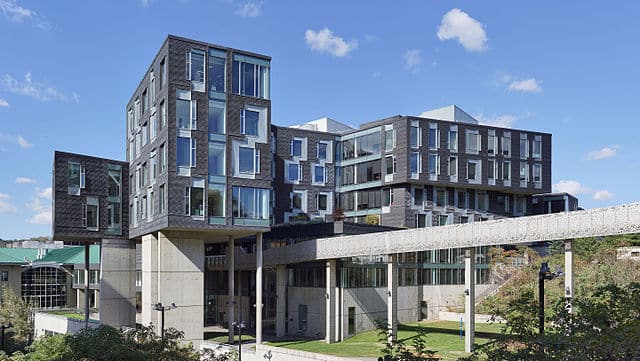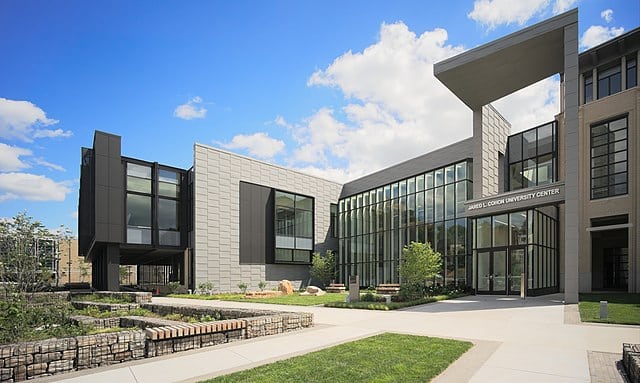Since its inception in the early 1900s, Carnegie Mellon University has been home to some of the greatest genius and talents of this century.
From Nobel prize winners to famed actors, architects and politicians alike, America has been shaped by the influence of this famed university’s alumni.
The world of television will never be the same after being influenced by notable alumni Ted Danson, Ethan Hawke, and Josh Gad.
Likewise, Broadway will never forget legends such as Hamilton’s Renee Elise Goldsbury or composer Stephen Schwartz.
Stephanie Kwolek, the inventor of Kevlar, received her National Medal of Technology and Innovation after receiving her education from Carnegie Mellon, stepping into the ranks of others who changed the world of science and technology.
Though first created with research in mind, Carnegie Mellon University has become a learning hub for everything from technology to the arts.
In addition to being the first ever computer science department, this famed university is also home to the oldest theater department in the country.
Regardless of the field, the world-class quality of education bestowed by Carnegie Mellon is a practical guarantee of a successful future.
With a reputation like this, it is no wonder that every year, tens of thousands of hopeful applicants take their shot at admittance into this renowned university.
To learn more about the early decision process and how to gain an edge into admission, read on!
Carnegie Mellon Early Decision Acceptance Rate

Carnegie Mellon University has an early decision acceptance rate of 19%.
Though this rate is only slightly higher than its average acceptance rate of 15%, in a university as elite as this one, every percentage counts!
Of the over 25,000 students who applied for admittance into this university, only just over 4,000 received that cherished acceptance letter.
Like many other major universities, Carnegie Mellon is stepping away from mandatory standardized testing. This being said, all the data indicates that these tests still play a vital role in how students are accepted.
To be accepted, most students must score an average of 1510 on their SAT, with a 3.84 GPA or higher.
This is a highly competitive learning environment, and Carnegie Mellon’s dedication to prestige ensures that they accept only the highest percentage of applicants.
However, rather than taking this as a reason to avoid application, potential students should anticipate the exciting challenges that lie ahead in the halls of this renowned university!
A degree from Carnegie Mellon shows potential employers more than just the ability to pursue an educational opportunity; it shows a level of dedication and perseverance that speaks volumes throughout this country and beyond.
According to one recent study, Carnegie Mellon Alumni earned an average of $70,900 per year immediately following their graduation.
This placed them at the top of the list, above every other famed and respected university in the state of Pennsylvania.
Though the process of applying to such a competitive university can be stressful, the rewards far outweigh the potential worry!
Carnegie Mellon ED Decision Date
Early Decision I students will be informed of Carnegie Mellon’s decision by December 15th. Additionally, Early Decision II students will be informed by February 1st.
The same criteria judge these two waves of applications, but the differing plans make it easier for students to be sure that they are making the best decision for themselves.
Both early decisions I and II are available to all potential applicants except those hoping to join very specific schools.
Early decision I is not available for any student hoping for a future in the school of acting, directing, dramaturgy, musical theater, or the school of music.
Additionally, early decision II is open to every school except those of drama, music, design, and art.
When applying for an early decision, students should be fully aware: Carnegie Mellon does not offer early action.
This means that, in submitting an early decision application, students are agreeing to attend no other university than this one.
Before submitting an application for early decision, students should be absolutely sure that they fully understand the costs, majors offered, and other qualities that go into attending this university.
Though this news may come as a point of stress, it shouldn’t.
Carnegie Mellon University is well known for its dedication to helping its students move into their futures safely and comfortably.
This university’s Office of Undergraduate Admission is available by email, phone, or live chat five days a week to help answer any questions students may have about this process.
Carnegie Mellon Early Decision Deadline

Early Decision I students have an application deadline of November 1st. Early Decision II students have an application deadline of January 3rd.
Because an early decision application guarantees that, if accepted, a student is declaring their intention to attend this university, the route they take is incredibly personal.
Students who are fully confident in their dream to attend this university should take the chance as quickly as possible, taking advantage of early decision I.
If accepted, they have a matter of weeks to begin enrollment and step forward into their futures.
Students who need a bit more time to decide can still feel confident in entering the early decision II wave of applicants, which should still allow them to take advantage of that early acceptance edge.
To make this deadline, students should complete all stages of the application process no later than January 3rd.
Most often, even students who are positive that their future will lead them to Carnegie Mellon University put off this decision for one reason: finances.
Students of lower income brackets may feel anxiety around declaring their intention to attend any major university, even one so prestigious as this.
To help combat that, Carnegie Mellon is incredibly clear in their payment options, helping students through personalized counseling or overall price calculators. Through these tools, students can better estimate how they can use financial aid, scholarships, and grants to offset the cost of higher education.
Regardless of what path a student chooses to take, they should do so with clarity, knowledge, and confidence.
Carnegie Mellon Early Decision Deferral Rate
Though Carnegie Mellon does not release their early decision deferral rate, they do allow students to defer the college instead, permitting them to apply for up to two “gap years” at a time.
To take advantage of this process, a student simply must be aware of a few stipulations.
While absent from Carnegie Mellon, students must agree not to enroll in any other university, whether that be a two or four-year college of study.
Because all first-year students are required to begin their studies in the fall semester, a deferment must be a minimum of one full year. Single semesters are excluded from this experience.
Finally, to take advantage of this process, a student must pay their initial enrollment fee, then email the office of admission to explain their situation.
After this, the office will personally send the proper forms for students to complete and resubmit.
This process can help students in any number of ways: allowing them to save money to better focus during the year, attend to unexpected needs, or simply enjoy a year of travel prior to buckling down for another year of study.
When completing this process, students should keep in mind that simply filling out a deferment application does not guarantee that it has been accepted!
Students will know that their deferment request has been accepted only after they receive an official confirmation letter.
The bottom line is this: Carnegie Mellon understands that one of the risks of early decision is that it is impossible to fully predict what state a student’s life will be in during the actual time of admission.
This process allows a period of grace, ensuring that the business and unpredictability of life will not interfere with a student’s dreams.
How to Apply to Carnegie Mellon for Early Decision

The early decision application process for Carnegie Mellon is incredibly simple.
To apply, students simply need to fill out an online application before the specified due date.
Additionally, students should complete the early decision agreement, which simply states that students know that, if accepted, they are in full agreement to attend this university.
Interestingly, Carnegie Mellon is upfront about its heightened expectations for early decision applications.
In addition to advising that all students complete their standardized tests well before the November deadline, they express an interest that only applicants who are confident in their acceptance apply in this early wave.
Because each specific college within this major university has specific qualifications, prospective students should take care to fully research the exact requirements prior to any form of application.
In doing so, they may also learn a bit more about the competition that awaits their applications.
According to the college of design within this school, “early decision is for students who want to declare Carnegie Mellon as their first choice.”
The same information goes on to describe how this competition leads many students to choose regular admission over early decision.
Ultimately, whether a student chooses to jump into the competition of early decision or wait out the tide is a personal decision.
To ensure they have the best possible chances, each student should thoroughly research their area of study and be sure they are aware of all the potential rewards that await them.














